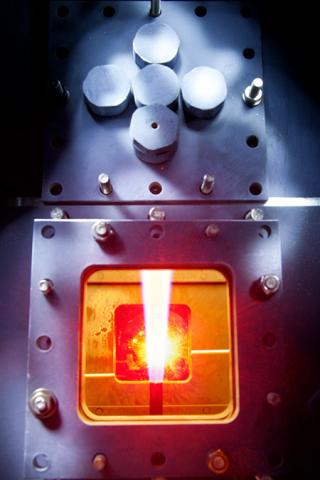Thermal transfer in reactive media
Context
Increasingly significant environmental constraints require a radical review of both energy consumption patterns and their impacts in terms of pollutant production or greenhouse gas emissions. In this context, the field of reactive media is a vast field of study, which covers one of the broadest spectra of application, from transport (motorization ...) to industry (burners ...), passing by the urban system, where heating problems can coexist with those of fire safety. To meet the socio-economic stakes and lift the scientific barriers still numerous in this specific theme of aerothermochemistry, technological breakthroughs are absolutely necessary, and they can not be envisaged without a detailed understanding of the physical mechanisms involved. In particular, the analysis of the interactions of the reactive medium with its often complex and confined environment, particularly from the point of view of heat transfer, represents a major challenge to be met.
Objectives
-
Identify and analyze the mechanisms involved in the interaction of a flame with a wall, passive or chemically active
-
Understand and analyze the role of heat transfers in the stabilization of premixed and partially premixed flames
-
Evaluate the relative contribution of the different modes of heat transfer to the behavior of reactive media
-
Implement new diagnoses dedicated to the measurement of wall temperatures and heat fluxes in high temperature complex environments
-
Develop models of radiative properties of combustion media adapted to the specific needs of modellers (in terms of calculation and precision cost)
Scientific skills
-
Experimental study of premixed and non premixed combustion in laminar and turbulent flows;
-
Measurement of heat transfer in reactive flow;
-
Optical metrology for the study of aerodynamic and chemical fields in a reactive medium;
-
Experimental study of the dynamics of flow and evaporation of a fluid on a wall;
-
Modeling the radiative properties of gases and soot particles.
Some international collaborations
Brigham Young University (Provo, USA), National Research Council (NRC, Canada), North Carolina State University (Raleigh, USA).
Some national collaborations
European Center for Research and Advanced Training in Scientific Computing (CERFACS, Toulouse), Interprofessional Research Complex in Aerothermochemistry (CORIA, Rouen), IFP Energies Nouvelles (Rueil-Malmaison), Institut P '(Poitiers), Laboratory "Molecular Energy and Macroscopic, Combustion "(EM2C, Paris), Prisme Laboratory (Orléans), RAPSODEE Laboratory (Albi), LAPLACE Laboratory (Toulouse).
Recent industrial partnerships
- Company LE RUBIS SA, with which a LabCom (joint research program between an academic laboratory and a SME / ETI) entitled "Research, Analysis and Innovation for Burners of Growth Verneuil" (RAINBOV) was developed
- Continental Automotive, Atlantic Group, ONERA, PSA Peugeot Citroën, Renault, ...


